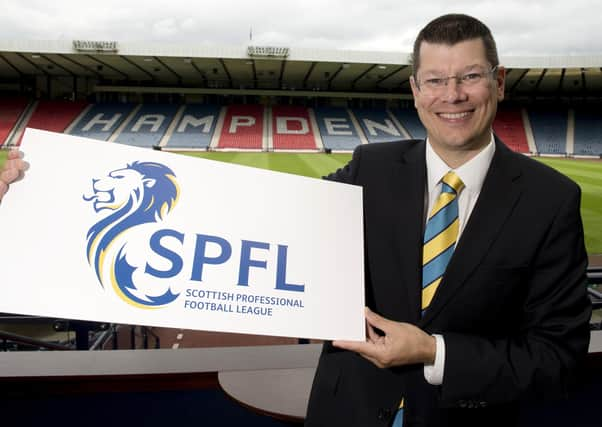Iain McMenemy: Reconstruction saga highlights SPFL dysfunctionality


I’ll start with the obvious – reconstruction. As we all know the talks on reconstruction have collapsed, once again, and as its stands the league will continue with the status quo of 12, 10, 10, 10 clubs across the divisions next season. This is all now subject to legal action.
This is a disappointing end, if it is the end, to a saga that has been dragged out and mismanaged over an all too lengthy and embarrassing period.
Advertisement
Hide AdAdvertisement
Hide AdHowever, this single issue brings to the fore, and puts it on display for all to see, the dysfunctionality in our league set-up. If we couldn’t come together and find a solution to deal with problems affecting our own members during a global pandemic, then when can we?
I’m not pointing the finger at any club or individual in particular, for no other reason than I am sure that everyone felt justified in the way they went about their business, and some had perhaps little confidence in the process. But that shouldn’t stop us from soul-searching and asking ourselves why we failed. I include myself in there too.
I am in favour of reconstruction. I see the merits in enlarged leagues. I have heard the call from players and supporters who think the current set-up is stale. But I wasn’t able to achieve change.
I’ve wanted changes to the culture within the SPFL. I’ve argued for greater transparency. I’ve argued for a more equitable distribution of funding. But the reality is that very little has changed.
Scottish football rarely embraces change. The danger is that we are in effect moribund.
So where do we go from here? If we cannot see past our own self-interest, then we need stronger leadership. And if we truly are locked in an endless cycle of institutionalised inertia, then we need to consider expanding the role of independent involvement on our Board. If we find ourselves constantly looking inward, then perhaps the answer is to look for guidance externally.
We struggle to reach out. We do little to involve supporters who contribute so much to our clubs and our game. At times, we fail to even listen to their opinions. Their experiences should shape our offering. We lack a coherent strategy. As a league body, we need to be able to articulate where we see the game going. We need to set the direction and determine the means by which we navigate our way there. We need to target growth, not only financially, but in areas such as our fan base, our clubs individually and collectively, our stadium and infrastructure, and our progression in non-domestic competitions. Above all else, we need to inspire.
Scottish football needs supporters. It needs sponsors. It needs people to see us in a positive light so that they aspire to be part of it and inspired to join us on the journey. We offer little of that. Over the past few months, we have done ourselves no favours.
Advertisement
Hide AdAdvertisement
Hide AdOne significant positive has emerged from this depressing period, and that was James Anderson stepping forward to make a donation to help clubs survive. We need to reflect on his reasons for doing so. He made no mention of the vitality of our game, or the competitiveness of our cups. Instead, he talked about the positive impact that football has always had on our communities. Contrast this with the likes of Gordon Strachan who called for a cull of clubs and whose recent comments suggested that half of all clubs should have no place in the professional game.
Our game can be our own. We don’t need to aspire to mirror the glamour, size and scale of other nations. In many ways, our game in Scotland reflects who we are as a nation. We have those who are more successful than others, but we all have a place. We are local. Community and belonging matters. We have authenticity and realism. There is a connection between players and supporters. At times we compete for success, at other times we fight for survival.
These are our strengths, but we don’t do enough to embrace them. We spend too much time peering over the hedge longingly at what others might have.
When we formed our league, we built into the structure a set of rules that were protectionist in nature. Arguably, those same “protections” now serve to damage us by limiting our ability to progress, change or adapt.
Ultimately, we need to own up to the problems in our game and accept responsibility for them.
A message from the Editor:
Thank you for reading this story on our website. While I have your attention, I also have an important request to make of you.
With the coronavirus lockdown having a major impact on many of our advertisers - and consequently the revenue we receive - we are more reliant than ever on you taking out a digital subscription.
Subscribe to scotsman.com and enjoy unlimited access to Scottish news and information online and on our app. With a digital subscription, you can read more than 5 articles, see fewer ads, enjoy faster load times, and get access to exclusive newsletters and content. Visit https://www.scotsman.com/subscriptions now to sign up.
Advertisement
Hide AdAdvertisement
Hide AdOur journalism costs money and we rely on advertising, print and digital revenues to help to support them. By supporting us, we are able to support you in providing trusted, fact-checked content for this website.
Joy Yates
Editorial Director
Comments
Want to join the conversation? Please or to comment on this article.